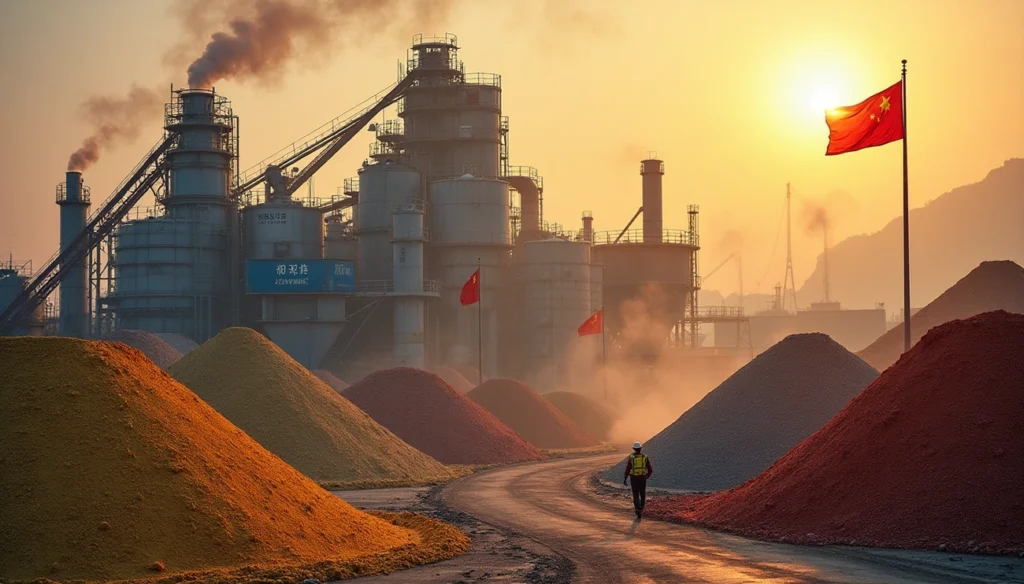The European Union faces a major challenge as China maintains its near-monopoly on rare earth production before a crucial July summit. China dominates this sector with roughly 60% of global supply and controls an overwhelming 90% of processing and refining operations. Manufacturers across Europe need these 17 metallic elements to build advanced technologies.
China announced a “green channel” to accelerate rare earth licenses for EU companies in May. The results have been disappointing. EU diplomats report that barely half of several hundred applications show any processing progress. Trade tensions have intensified this bottleneck. China recently tightened export controls for these minerals after the United States announced new tariffs. The EU now sees the upcoming summit as a crucial chance to secure steady access to these strategic resources. This meeting comes just two weeks after a U.S.-set deadline for trade partners to strike deals that would prevent higher tariffs.
EU presses China for rare earth access ahead of July summit

European leaders are working hard to get vital rare earth materials from China before the July 24-25 summit in Beijing. The European Union has made rare earths its only focus for its China mission until this vital meeting.
Why rare earths matter to the EU economy
Rare earth elements—a group of 17 specialty metals—are the foundations of Europe’s technological future. These materials play a vital role in smartphones, wind turbines, electric vehicles, and many more high-tech applications. The EU’s green transition plans will make the need for rare earths grow fast—five to six times by 2030 and six to seven times by 2050 compared to current levels.
The EU faces a serious problem. It doesn’t produce any of these vital materials, and China supplies 98% of its rare earth magnet needs. This reliance creates a major security challenge, especially when you have Europe’s automotive industry depending heavily on these materials for electric vehicle production.
What the EU just needs from China
European officials want big changes to China’s current export control system. The EU wants Beijing to give rare earth licenses for longer periods instead of the current shipment-by-shipment process, or remove them completely for European countries.
It also wants China to separate the EU from the United States in its rare earth export policies. This request follows China’s commerce ministry’s announcement of a “green channel” to accelerate rare earth licenses for EU firms—a promise that hasn’t delivered much so far.
How the July 24–25 summit fits into broader trade talks
The upcoming summit marks a vital point in EU-China relations as they celebrate 50 years of diplomatic ties. All the same, trade tensions loom over the talks. China has fought back against EU tariffs on Chinese electric vehicles by putting anti-dumping measures on European brandy and looking into EU dairy products and pork.
European negotiators face a tough balancing act as they handle relations with both China and the United States. An EU official pointed out that the deadline to reach an agreement with the US makes things harder. The US might want Europe to take a tougher stance on China in exchange for lower American tariffs.
China delays rare earth licenses despite green channel promises
Image Source: China Legal Experts
Despite China’s promised “green channel” for rare earth exports, European firms still face major delays in securing materials they need. The European automotive supplier association CLEPA reports that companies have submitted hundreds of export license applications since April, but only about 25% have received approval. An EU diplomat confirmed that barely half of several hundred applications show any signs of processing.
Status of EU applications for rare earth exports
The application process varies widely between Chinese provinces. Some licenses get denied on procedural grounds while others require companies to disclose sensitive information, including their intellectual property. Volkswagen has managed to secure “a limited number” of export licenses, but approvals come too slowly for most manufacturers to meet their production needs.
The backlog of applications keeps growing each day and puts more pressure on supply chains. Industry sources say even non-restricted rare earth materials undergo extra scrutiny at customs. Some suppliers won’t ship these materials because of stricter inspection requirements.
What Chinese officials have said about the delays
Chinese Commerce Minister Wang Wentao stated that “export control on rare earths and other items is an international practice”. He later said China “attaches great importance to Europe’s concerns and is willing to establish a green channel for eligible applications, fast track the examination and approval”.
The situation changed during bilateral talks with EU Trade Commissioner Maroš Šefčovič. Wang asked for reciprocal action, requesting the EU to “adopt effective measures to facilitate, safeguard, and promote compliant trade of high-tech products with China”. Beijing seems to utilize rare earth access as a bargaining chip in broader trade talks.
How EU businesses are affected by customs bottlenecks
Problems continue at customs checkpoints even for shipments with approved licenses. The European Chamber of Commerce in China’s secretary general Adam Dunnett pointed out that “even once the license is given, delays can still be seen in customs clearances”.
European industry faces increasingly serious consequences. CLEPA’s Secretary General Benjamin Krieger warned that “China’s export restrictions are already shutting down production in Europe’s supplier sector”. VDA’s President Hildegard Müller added that “if the situation does not change quickly, production delays and even production stoppages can no longer be ruled out”.
Trade tensions escalate over EVs, brandy, and critical minerals
Image Source: China Briefing
Trade disputes between the European Union and China have reached new heights. Rare earth minerals now serve as a powerful bargaining tool amid escalating retaliatory actions.
EU tariffs on Chinese EVs and China’s retaliation
The EU approved major tariffs on Chinese electric vehicles in October 2024. Rates now range from 7.8% for Tesla to 35.3% for China’s SAIC, adding to the standard 10% car import duty. The European Commission found that Chinese manufacturers received unfair advantages through preferential financing and below-market material costs. Chinese brands grew their EU market share from less than 1% in 2019 to 8%. Market experts predict this could reach 15% by 2025.
China was quick to strike back. Their commerce ministry stretched its anti-dumping investigation of European Union brandy to April 5, 2025. French cognac makers Hennessy and Remy Martin now face steep security deposits – almost 40% on their Chinese imports.
China’s anti-dumping probes into EU goods
China didn’t stop at brandy. Beijing extended its anti-dumping investigation of EU pork imports until December 16, 2025. Spain, Netherlands, and Denmark became primary targets. These countries supply more than half of China’s pork imports, worth about AED 22.03 billion in 2023.
On top of that, China launched an investigation into EU dairy products. Experts view these three probes as direct payback for the EV tariffs.
How rare earths became a bargaining chip
China played its rare earth card strategically during this trade standoff. After talks between Chinese Minister of Commerce Wang Wentao and EU Trade Commissioner Maroš Šefčovič, China offered a “green channel” for rare earth exports. This offer came with strings attached – progress on EV tariff talks.
Chinese officials keep linking rare earth access to the EV dispute resolution. Their commerce ministry spokesperson brought up rare earth issues right after discussing the EV case. They urged the EU to “meet China halfway” to “help compliant trade in high-tech products to China”. Access to these vital minerals has become tied to broader trade talks before the July summit.
EU seeks long-term rare earth deal amid U.S. pressure
Image Source: Reuters
The European Union faces mounting pressure as negotiations heat up before the July summit. Their plan to secure rare earth access has become more complex due to ongoing talks with the United States. The EU must guide through intricate geopolitical pressures while tackling immediate supply chain issues.
How U.S. tariff deadlines complicate EU-China talks
The July 9 deadline to reach agreements with the United States creates major hurdles for EU negotiators. One EU official stated this timeline makes it “difficult for the EU to work on a deal with Beijing”. European leaders feel the squeeze as the U.S. might push Europe toward a tougher position against China in return for lower American tariffs. This creates a delicate balance where European leaders need to please both American and Chinese interests.
What the EU wants: longer licenses or scrapping them
European officials seek fundamental changes to China’s export control system beyond quick fixes. The core demand states that “the EU wants China to grant rare earth licenses for a longer period or to scrap them for exports to the bloc”. This plan would help European manufacturers predict their operations better after supply shortages forced production lines across Europe to stop.
Why China is separating between EU and U.S. partners
Beijing seems to treat European and American partners differently. ECIPE Director Hosuk Lee-Makiyama explained, “If China wants the EU equidistant between itself and the Trump administration, China’s trade regimes cannot equate the U.S. and Europe either”. This strategic split became clear when China offered to fast-track civilian-use rare earth export licenses for American companies during recent discussions.
Expert insights on EU’s strategic vulnerabilities
Europe sits in a vulnerable position within the rare earth supply chain, according to strategic analysts. The EU depends on China for 98% of its rare earth imports, creating what Commissioner Stephane Sejourne describes as potential “economic blackmail”. Sejourne suggests creating shared strategic reserves: “All European countries today have strategic reserves for oil and gas. We should do the same for strategic raw materials”. The EU has also started 13 new raw material projects outside the bloc to vary its supply sources.
EU-China Rare Earth Negotiations at Critical Juncture
The July summit will be a defining moment for EU-China relations about rare earth access. China controls about 60% of global rare earth supply and 90% of processing capacity. This leaves European manufacturers exposed to supply disruptions. Chinese imports now fulfill 98% of EU’s rare earth magnet needs.
China promised a “green channel” to speed up licensing, but the results have fallen short. Only 25% of applications from European companies show any progress. This has forced production slowdowns throughout Europe. The situation has become critical as automotive suppliers might shut down without steady access to these materials.
Trade tensions make these talks even harder. EU tariffs on Chinese electric vehicles led Beijing to investigate European brandy, pork, and dairy products. The US tariff deadline of July 9 puts extra pressure on European diplomats who must balance relations with both powers.
European officials want real reforms instead of quick fixes. They need longer-term licenses or no export license requirements at all for EU companies. The bloc wants China to treat European partners differently from American ones in its export rules.
EU Commissioner Stephane Sejourne looks beyond today’s problems. He suggests building strategic reserves for rare earth materials, much like current oil and gas reserves. The European Union has started thirteen raw material projects outside China to vary supply sources and become less vulnerable.
The July summit means more than just another diplomatic meeting. It offers a vital chance to fix supply chain weaknesses that put European technological independence and green transition goals at risk. Both sides know what matters here – creating lasting rules for rare earth trade that work for Chinese exports while keeping European manufacturing secure.





